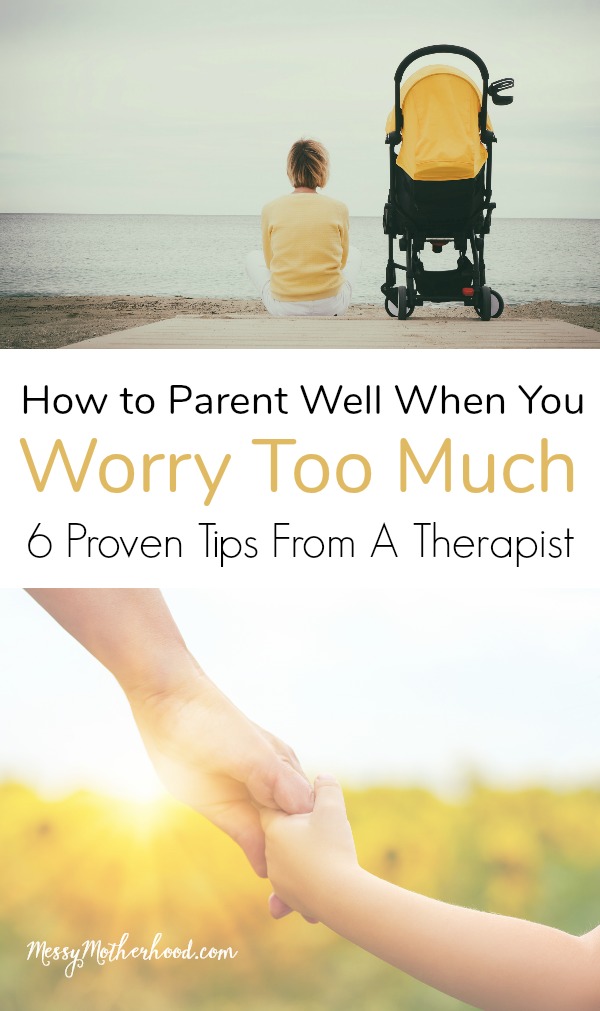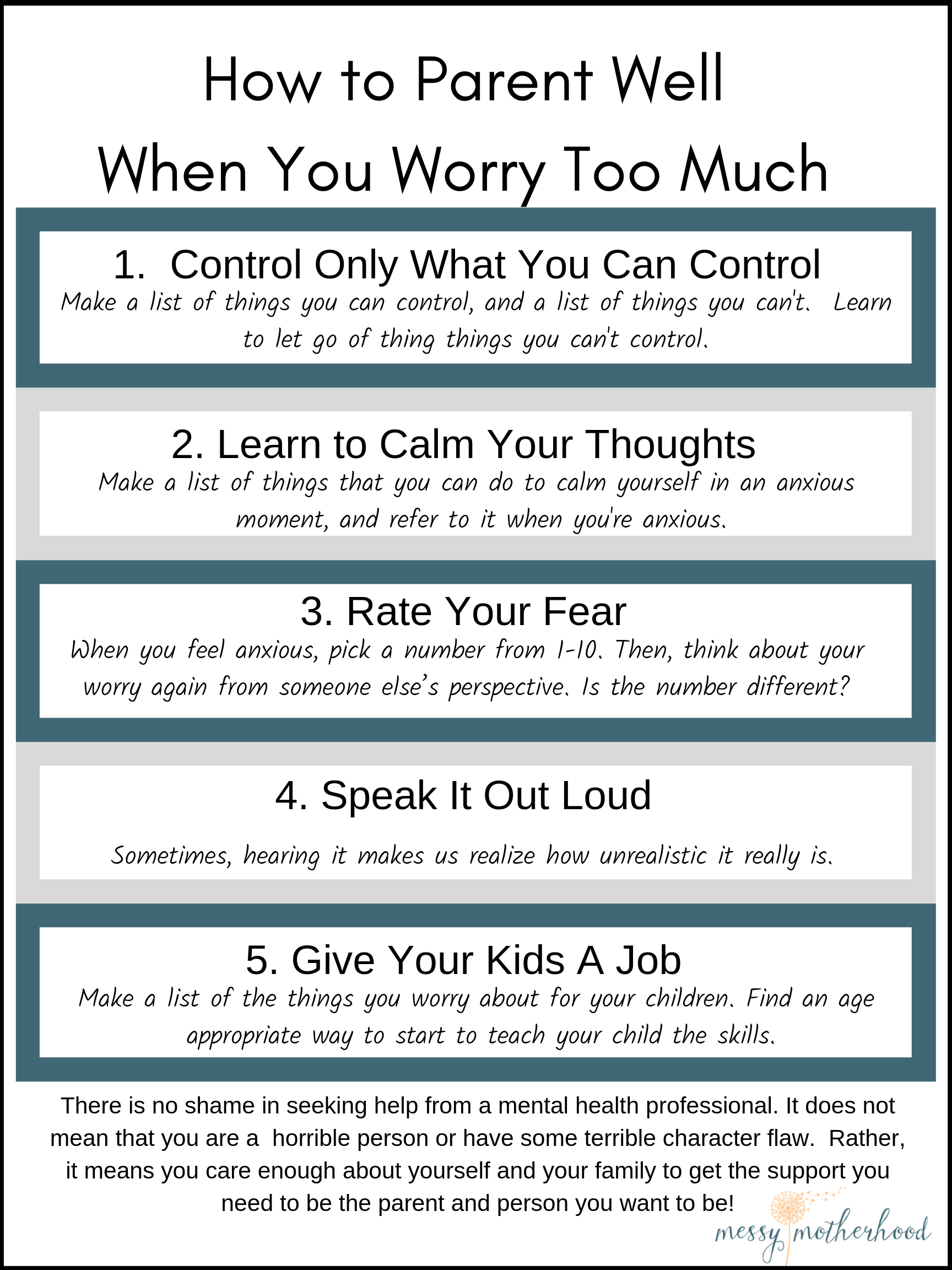It’s midnight. You’re still awake because your mind is racing with worry.
What if Sam doesn’t make the baseball team?
When will Sophie stop wetting the bed? Maybe something’s wrong.
Is Mike mad at me? He’s been quiet lately.
Am I becoming an angry mom?
It’s not much better during the day. Your worries consume you:
- You pick out your kids’ clothes so they look nice and won’t be teased.
- You check homework and grades online to make sure your kids are on track for college.
- You avoid play dates that involve certain playground equipment because it’s too dangerous.
Being cautious is a good thing; caring about your kids is what parents do. The problem comes when the worry begins to negatively affect your parenting. Your marriage. Your friendships.

When worry becomes too much.
If you feel overwhelmed by worries, it may feel like there is no way out.
But there is…
Control Only What You Can Control:
Anxiety often convinces us that we have more power over our circumstances than we really do.
Unfortunately, there are very few things that we can actually control: our own actions, reactions, and choices. For example, we can decide what we serve for dinner, but we can’t force anyone else to eat it.
- Tip: Take a piece of paper and make a line down the middle. On one side write the things that you can truly control in your life. On the other side, write the things that you cannot control. At first, this may make you feel more anxious! That’s ok. Next time you feel an anxious thought creep up, imagine which side of the line it is on. If you can do something about it, great! If not, it’s best to let it go.
Learn to Calm Your Thoughts:
Feeling in control of out-of-control thoughts is a skill that takes time and practice.
Don’t feel bad if your worried thoughts continue to fill your mind. Pushing them aside will get easier with time.
Continue working on finding new strategies to combat anxiety until you find a few that work.
- Tip: Make a list of things that you can do to calm yourself in an anxious moment. It is easier to think of things when you are calm, and then refer to the list later. Many people use mantras (“I am calm” or “I am peaceful”), prayer, journaling, art, Try music
, getting outside or calling a friend.
Read here about how our thoughts control our emotions and actions.
Rate Your Fear:
Worries are often exaggerated and misrepresented in our minds.
It’s helpful to put our fears into perspective.
How much of a problem is it, on a scale of 1 (no big deal) to 10 (call 911!!)? Where would other people place it on the scale? Do I have any facts to back up my worry? Who else is worried about this?
- Tip: Find a worry that is bothering you right now and pick a number from the scale (1 – 10). Then, think about your worry again from someone else’s perspective. Is the number different? What would help you move your worry down the scale?

Speak It Out Loud:
Fears love hiding away in the dark corners of our mind. Take away their power by saying your fear or worry out loud!
Sometimes, hearing it makes us realize how unrealistic it really is: “I’m worried that if I don’t remind you to wash your hands, you’ll get sick, then I’ll have to miss work to stay home with you, and I’m really busy at work right now…”
- Tip: Not every fear is appropriate for children to hear. We don’t want to burden our kids with adult problems or thoughts. It’s ok to say something general: “Mommy’s worries are really big right now. I’m going to take a few deep breaths to calm down.”
Give Your Kids A Job:
If a lot of your worries focus on your children’s ability to complete a task or follow directions, it’s time to do some teaching and shift the responsibility to your kids.
Instead of worrying about how they will do, equip them to do it well! This might mean creating a visual chart so your son remembers everything for school or practicing what to do if they are bullied.
- Tip: Make a list of the things you worry about for your children. Then, write any skills they need to learn or practice. Find an age-appropriate way to start to teach your child the skills. This will help you both feel more confident!
Get Professional Help:
Sometimes, worries are just too big to handle on our own. If you are concerned about the way that worry is impacting your children, your marriage or your job, it’s time to get outside support.
There is no shame in seeking help from a mental health professional. It does not mean that you are a horrible person or have some terrible character flaw.
Rather, it means you care enough about yourself and your family to get the support you need to be the parent and person you want to be!
- Tip: It’s ok to ask a lot of questions before you start seeing a therapist. You want to make sure it is someone you feel comfortable talking to and that they are qualified to help. However, make sure the search for a “perfect” therapist doesn’t keep you from getting the help you need!
Next time you’re laying awake at night or feel like the worries are snowballing in your mind, pick one of these tips to try. You may find that one works better than another or that you need a combination of them all!
Sometimes it’s hard to remember these tips when you really need them. So I’ve put them all together in one place. Just click here to download your copy of “How to Parent When You Worry Too Much.”


Nicole Schwarz is a mom to 3 little girls, a Licensed Therapist, and Parent Coach. Check out her blog, Imperfect Families for more positive parenting tips and learn more about how Parent Coaching can help you find solutions to your parenting challenges.

Thank you so much for your article! My friend is dealing with some major stress right now, and she’s having a hard time curbing the worry that comes along with it. I think this article will help her so much- thanks again!
Great post! As a past psychiatric nurse, I think your suggestions are really spot on and can help a lot when faced with anxiety.
I deal with my share of anxiety myself, and I have learned over the years what works for me. Putting the worries into words (specifically making a list) tends to help them seem less overwhelming. Recognizing which I can change or do something about vs which I cannot is also key. And just talking about them diminishes their power!
Sometimes it all seems worse when you just let the worries swirl around in your head without an outlet!
Seriously, nice post! I’m going to share it with my blog’s FB group! 🙂
thanks for the great tips i worry about my kids when they are in the playground haha
This is me. It has been my entire life. I’ve always been a worrier. I can tell when it’s getting out of control though. These are great suggestions.
Super post! Really nice info, thank you!
Nice post. Thanks so much!
Thank you for this great article.
Parents worry too much and years devoted to play and joyful learning are replacing with a round robin of scheduled activities, making childhood a stress-filled time of striving and competing.
Days are crammed with extracurricular activities such as ballet, judo, tennis, piano, sport, art projects, and the endless grind of homework targets and additional tuition. Any leisure time at home has children entertained by giant screens and electronic gadgets minimising any need for personal interaction, resulting in concerned parents maintaining complex social calendars to compensate, organising playdates weeks in advance.
I am grateful to read this post.
I have learn how to calculate my big and small worries.
Merry Christmas and happy new year.
thanks